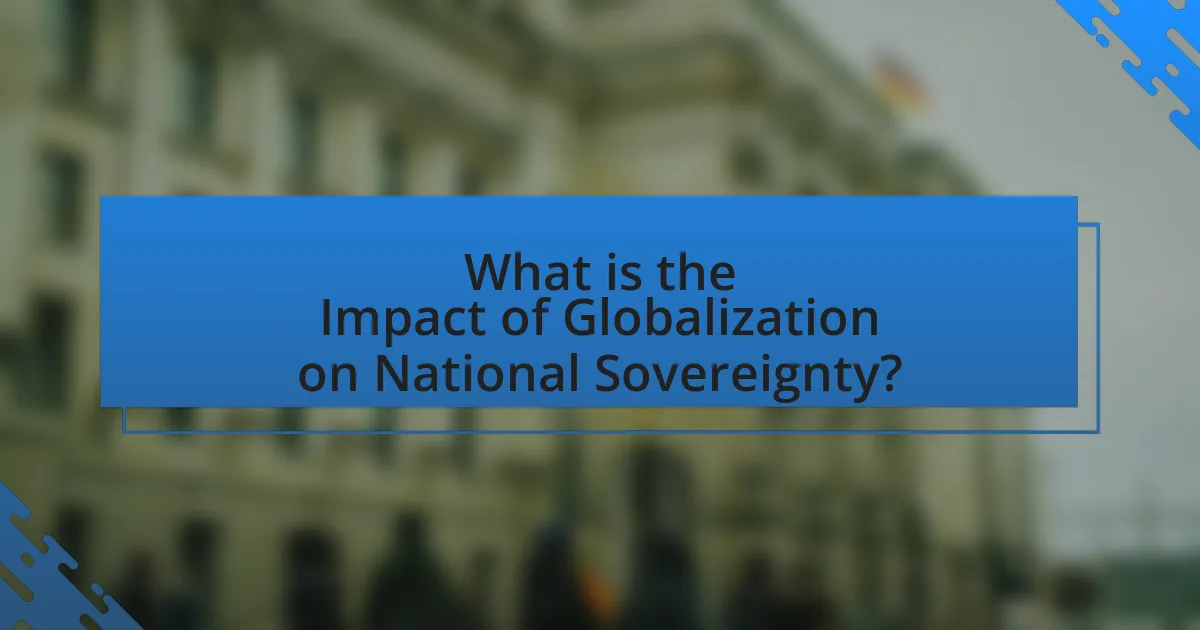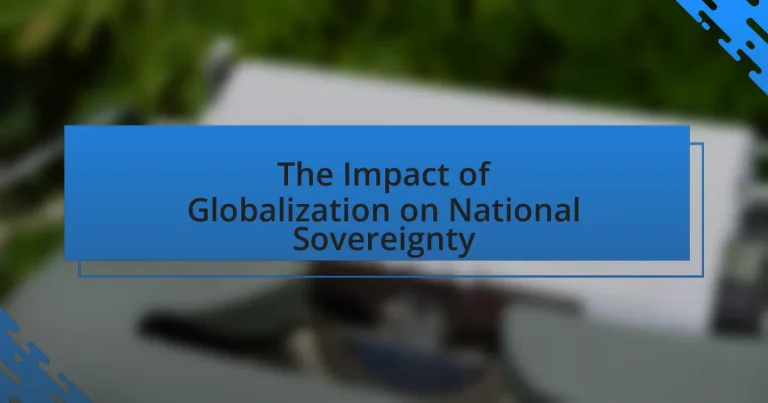The article examines the impact of globalization on national sovereignty, highlighting how increased interconnectedness diminishes states’ control over their policies and regulations. It discusses the historical evolution of national sovereignty, the influence of multinational corporations, and the role of international organizations in constraining domestic governance. Key dimensions such as economic interdependence, political integration, and cultural exchange are analyzed, along with the challenges and strategies nations adopt to maintain sovereignty in a globalized context. The article also explores future trends, including the effects of technological advancements and the role of emerging economies in redefining national sovereignty.

What is the Impact of Globalization on National Sovereignty?
Globalization significantly impacts national sovereignty by diminishing the control that states have over their own policies and regulations. As countries become more interconnected through trade, investment, and communication, they often face pressures to conform to international standards and practices, which can limit their ability to make independent decisions. For instance, the rise of multinational corporations can lead to economic dependencies that undermine local governance, as seen in cases where countries alter labor laws or environmental regulations to attract foreign investment. Additionally, international agreements and organizations, such as the World Trade Organization, impose rules that member states must follow, further constraining their sovereignty. This dynamic illustrates how globalization can lead to a reconfiguration of power, where national governments may prioritize global economic integration over local autonomy.
How does globalization influence the concept of national sovereignty?
Globalization diminishes the concept of national sovereignty by increasing interdependence among states and reducing the ability of governments to control their own economic and political affairs. As countries engage in global trade, they often adopt international regulations and standards that limit their autonomy. For instance, membership in organizations like the World Trade Organization requires nations to adhere to rules that can override domestic laws. Additionally, the rise of multinational corporations can lead to economic pressures that compel governments to prioritize foreign investment over local interests, further eroding their sovereignty.
What are the historical contexts of national sovereignty in relation to globalization?
National sovereignty has historically been shaped by globalization through the evolution of state power and international relations. The Peace of Westphalia in 1648 marked the beginning of the modern state system, establishing the principle of territorial sovereignty and non-interference, which became foundational for national sovereignty. As globalization progressed, particularly in the late 20th century, economic interdependence and international institutions began to challenge traditional notions of sovereignty. For instance, the establishment of the World Trade Organization in 1995 facilitated global trade but also imposed regulations that limited national autonomy. Additionally, the rise of transnational corporations and global governance frameworks has further complicated the relationship between national sovereignty and globalization, as states often cede some control over economic policies to participate in the global economy. These historical contexts illustrate how globalization has both influenced and transformed the concept of national sovereignty over time.
How has the definition of national sovereignty evolved with globalization?
The definition of national sovereignty has evolved from a focus on absolute territorial control to a more nuanced understanding that incorporates interdependence and shared governance due to globalization. As nations engage in international trade, treaties, and organizations, they often cede some degree of sovereignty to facilitate cooperation and address global challenges, such as climate change and security threats. For instance, the establishment of the European Union illustrates how member states have agreed to limit certain aspects of their sovereignty in favor of collective decision-making and economic integration. This shift reflects a broader trend where national sovereignty is increasingly viewed as a dynamic concept, influenced by global economic, political, and social interactions.
What are the key dimensions of globalization affecting national sovereignty?
The key dimensions of globalization affecting national sovereignty include economic interdependence, political integration, cultural exchange, and technological advancement. Economic interdependence reduces the ability of nations to control their own economies as global trade agreements and multinational corporations influence local markets and policies. Political integration, seen in entities like the European Union, requires member states to cede some degree of sovereignty in favor of collective decision-making. Cultural exchange can dilute national identities and values, as global media and migration introduce diverse influences. Technological advancement facilitates the rapid flow of information and capital across borders, often undermining traditional regulatory frameworks. These dimensions collectively challenge the autonomy of nation-states in a globalized world.
How do economic factors of globalization challenge national sovereignty?
Economic factors of globalization challenge national sovereignty by diminishing the ability of states to control their own economic policies and regulations. As multinational corporations operate across borders, they often influence local economies, leading to a reliance on foreign investment and trade that can undermine domestic decision-making. For instance, countries may feel pressured to lower labor standards or environmental regulations to attract foreign businesses, which can erode local governance and regulatory authority. Additionally, the integration of global supply chains means that economic crises in one region can have immediate repercussions on national economies, further limiting a government’s ability to act independently. This dynamic is evident in the 2008 financial crisis, where interconnected markets led to widespread economic instability, demonstrating how globalization can constrain national sovereignty.
What role does cultural globalization play in shaping national identity and sovereignty?
Cultural globalization significantly influences national identity and sovereignty by promoting the exchange of ideas, values, and practices across borders, which can lead to both homogenization and diversification of cultures. This process often challenges traditional notions of national identity as global cultural elements, such as media, fashion, and language, become integrated into local contexts. For instance, the widespread adoption of Western media and consumer culture can dilute local customs and traditions, leading to a more globalized identity that may conflict with national sovereignty. Additionally, cultural globalization can empower local identities by providing platforms for cultural expression and resistance against dominant global narratives, as seen in movements that celebrate indigenous cultures. Thus, while cultural globalization can erode certain aspects of national identity and sovereignty, it can also foster resilience and adaptation within local cultures.
What are the political implications of globalization on national sovereignty?
Globalization significantly undermines national sovereignty by transferring power from states to international institutions and multinational corporations. As countries engage in global trade and treaties, they often cede control over economic policies and regulatory frameworks to external entities, limiting their ability to govern independently. For instance, the World Trade Organization (WTO) enforces trade agreements that can restrict national legislation, compelling countries to align their laws with international standards. Additionally, the rise of supranational organizations, such as the European Union, illustrates how member states may relinquish aspects of their sovereignty in favor of collective decision-making, impacting domestic policies on issues like immigration and environmental regulations. These dynamics demonstrate that while globalization fosters economic interdependence, it also poses challenges to the traditional concept of state sovereignty.
How does globalization affect governmental authority and decision-making?
Globalization diminishes governmental authority and alters decision-making by increasing interdependence among nations and empowering multinational corporations. As countries engage in global trade and investment, they often face pressure to conform to international standards and practices, which can limit their ability to enact independent policies. For instance, the 1994 North American Free Trade Agreement (NAFTA) exemplifies how trade agreements can constrain national regulations in favor of corporate interests, leading to a shift in decision-making power from governments to global entities. Additionally, the rise of global issues such as climate change necessitates collaborative approaches, further reducing unilateral governmental authority.
What are the impacts of international organizations on national sovereignty?
International organizations significantly impact national sovereignty by influencing domestic policies and decision-making processes. These organizations, such as the United Nations and the World Trade Organization, often require member states to adhere to international agreements and standards, which can limit a nation’s ability to act independently. For instance, countries that are part of trade agreements may have to modify their laws and regulations to comply with international trade rules, thereby ceding some degree of control over their economic policies. Additionally, international organizations can impose sanctions or conditions on aid that compel nations to align with specific political or economic practices, further constraining their sovereignty. This dynamic illustrates how participation in international organizations can lead to a balancing act between national interests and global responsibilities.
How do different countries respond to the challenges posed by globalization?
Different countries respond to the challenges posed by globalization through a variety of strategies, including protectionist policies, regulatory reforms, and international cooperation. For instance, the United States has implemented tariffs and trade barriers to protect domestic industries, while the European Union emphasizes regulatory alignment among member states to maintain a competitive edge. In contrast, countries like China have embraced globalization by integrating into global supply chains while simultaneously enforcing strict regulations to control foreign influence. These responses are shaped by each country’s economic priorities, political ideologies, and social contexts, reflecting a complex interplay between national sovereignty and global economic integration.
What strategies can nations adopt to maintain sovereignty in a globalized world?
Nations can maintain sovereignty in a globalized world by implementing protective economic policies, enhancing diplomatic engagement, and fostering cultural identity. Protective economic policies, such as tariffs and trade regulations, can shield local industries from foreign competition, as evidenced by the United States’ use of tariffs on steel and aluminum imports in 2018 to support domestic manufacturing. Enhanced diplomatic engagement allows nations to negotiate favorable trade agreements and participate in international organizations, which can help balance global influences while asserting national interests. Additionally, fostering cultural identity through education and media can strengthen national unity and resilience against external cultural pressures, as seen in countries like Japan, which actively promote their cultural heritage to maintain a distinct national identity amidst globalization.
What policies have been effective in balancing globalization and national sovereignty?
Effective policies for balancing globalization and national sovereignty include trade agreements that incorporate labor and environmental standards, as well as regulatory frameworks that allow for national oversight of foreign investments. For instance, the European Union’s Common Commercial Policy integrates trade liberalization with social and environmental protections, ensuring that member states retain some control over their domestic policies while engaging in global trade. Additionally, the implementation of local content requirements in countries like India has allowed for the promotion of domestic industries while still participating in global supply chains. These approaches demonstrate that it is possible to engage in globalization while safeguarding national interests and sovereignty.
How can nations protect their cultural identity while engaging in globalization?
Nations can protect their cultural identity while engaging in globalization by implementing policies that promote local traditions, languages, and arts. For instance, countries like France have enacted laws to support their cultural industries, such as cinema and music, ensuring that local content is prioritized over foreign influences. Additionally, educational programs that emphasize national history and cultural heritage can strengthen citizens’ connection to their identity. Research shows that nations that actively promote cultural preservation alongside globalization, such as Japan with its cultural festivals and traditional crafts, maintain a strong sense of identity while benefiting from global economic integration.
What are the future trends regarding globalization and national sovereignty?
Future trends indicate that globalization will increasingly challenge national sovereignty as countries navigate economic interdependence and transnational issues. The rise of multinational corporations and global supply chains diminishes the ability of individual nations to control their economies independently. Additionally, international agreements on trade, climate change, and human rights further constrain national policies, compelling governments to align with global standards. For instance, the World Trade Organization’s influence on trade regulations exemplifies how global governance structures can limit national legislative autonomy. As a result, nations may experience a shift towards shared sovereignty, where collaborative governance becomes essential to address complex global challenges effectively.
How might technological advancements further impact national sovereignty?
Technological advancements may further erode national sovereignty by enabling transnational corporations and foreign entities to operate independently of state regulations. For instance, the rise of digital platforms allows companies to bypass traditional regulatory frameworks, leading to challenges in taxation and labor laws. A notable example is the influence of social media companies, which can disseminate information across borders, affecting public opinion and political stability without government oversight. Additionally, advancements in cybersecurity and surveillance technology can empower states to monitor citizens more effectively, but this can also lead to abuses of power and violations of privacy, further complicating the balance of sovereignty.
What role will emerging economies play in redefining national sovereignty in a global context?
Emerging economies will play a crucial role in redefining national sovereignty by challenging traditional power dynamics and promoting a multipolar world order. As these economies, such as India and Brazil, gain economic strength and political influence, they advocate for greater representation in global governance institutions, thereby shifting the balance of power away from established Western nations. For instance, the BRICS coalition, which includes Brazil, Russia, India, China, and South Africa, exemplifies this shift by creating alternative frameworks for cooperation that prioritize the interests of developing nations. This trend indicates that national sovereignty is increasingly being negotiated within a global context, where emerging economies assert their interests and influence international norms and policies.
What practical steps can nations take to navigate globalization while preserving sovereignty?
Nations can navigate globalization while preserving sovereignty by implementing strategic policies that prioritize local interests and regulatory frameworks. For instance, countries can establish trade agreements that include provisions for protecting domestic industries, thereby ensuring that local economies are not undermined by global competition. Additionally, nations can invest in education and workforce development to enhance the skills of their citizens, making them more competitive in a globalized economy.
Furthermore, countries can adopt regulatory measures that safeguard public interests, such as environmental protections and labor rights, which can help maintain national standards in the face of global pressures. Evidence of this approach can be seen in the European Union’s regulations that balance free trade with stringent environmental and labor laws, demonstrating that it is possible to engage in globalization while upholding national sovereignty.





